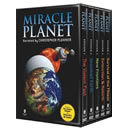Asteroid Strike
Geological findings prove that the impact of a large asteroid brought about the obliteration of up to 70% of all life on Earth 65 million years ago. Asteroid Strike traces each step of this catastrophic event, and shows how this planet's last occurrence of mass extinction led to the birth and evolution of the human species.
The formation of this theory came to be during an investigation into what caused the extinction of the dinosaurs, an event that has obsessed researchers for many decades. Thirty years ago, paleontologist Jan Smit made unearthed one of the most startling pieces of evidence in support of this theory while trekking among the rolling cliffs of northern Spain. Through careful chemical analysis of rock samples, Smit detected large quantities of iridium, an extremely rare element most commonly found in meteorites and asteroids. This revelation provided the breakthrough scientists had been searching for, and the hunt was on for the site where the asteroid's landing may have originated and evidence of the events that transpired in the aftermath of its impact.
As documented in Asteroid Strike, what follows plays like the ultimate detective story, as the filmmakers join a team of scientists on a journey of discovery across the globe from the mountain ranges of Colorado to the glorious natural environment of the Yucatan Peninsula. In retracing this global catastrophe, they make us frighteningly aware of our planet's vulnerabilities among the scope of an infinitely larger universe, and how our very existence was brought about by mere happenstance.
Hyper-realistic animations allow us to experience the asteroid's impact on a visceral level as waves of fire engulf all life in their path over thousands of miles. The resulting mass-scale tsunamis further decimated Earth's landscape. Following impact, the planet underwent severe episodes of climate change that would last for hundreds of years. It literally would have been Hell on Earth,
observes Dr. Dan Durda, a planetary scientist and one of the film's interview subjects.
In the midst of such devastation, life found a way to rebound. Therein lies the most fascinating and mind-boggling aspect of this film. As summarized by the narrator Tony Robinson, It's extraordinary that we may owe our very existence to one freak event.




Now here we are in late 2020, and I'm thinking it may have been better if an asteroid had taken out humans, too.
This is how myths are created.
Many thanks for a great documentary, but what annoys me is that the commentator keeps switching back and forth between miles and kilometers. So sad that some ppl still stick to the antediluvian system of miles, inches, drams, etc. C'mon, USA, why not join the rest of the modern world and use the metric system, After all, it's been around since Napoleon - and this is 20017.
Many thanks for a great documentary, but what annoys me is that the commentator keeps switching back and forth between miles and kilometers. So sad that some ppl still stick to the antediluvian system of miles, inches, drams, etc. C'mon, USA, why not join the rest of the modern world and use the metric system, After all, it's been around since Napoleon - and this is 20017.
The documentary was ok. the cgi wasn't great. the documentary failed to mention other theories which was disappointing, I think it lacked truth in some areas.
I'm curious to know if there's a way for them to determine whether it could have been a Tunguska style impact, and if so, how it could change their models including subsequent effects.
I liked the explanation of the physics of the strike and blast.
Ever other word in English sounds like a cliche when a Brit is speaking.
I watch the slow motion shock and thinking, whether it is an asteroid 65 million years ago made craters on the moon !?
Can't decide whether the cgi in this is good or bad..
You sir, are searching for absolutes where maybe the truth is.....it's y'know, not bad in places.
This is literally from 2008